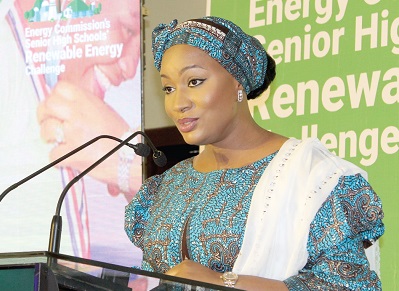
3rd SHS Renewable Energy Challenge launched
Industries in the energy sector have been urged to take advantage of the Energy Commission's Senior High Schools' Renewable Energy Challenge to build upon outstanding innovations from the contest.
The wife of the Vice-President, Samira Bawumia, said such innovations would help to develop the vast energy resource base of the country.
Advertisement
She said the country’s heavy dependence on biomass fuels, especially for cooking, had a lot of negative implications on the populace.
Mrs Bawumia said these at the launch of the third edition of the Energy Commission's Senior High Schools' Renewable Energy Challenge in Accra.
The third edition of the challenge has been dubbed: "Clean Cooking and Food Processing Using Renewable Energy Technologies", and participating schools will develop projects in the area of clean cooking methods using renewable energy.
"Unfortunately, this simple act of cooking, using unclean cooking solutions and fuels, leads to household air pollution, and is responsible for over 20,000 premature annual deaths in Ghana," she said.
She said there was, therefore, the need for the country to shift from dependence on biomass to clean and renewable energy.
Mrs Bawumia also stressed the need to address challenges of energy access, as well as clean cooking solutions, adding that it would in turn improve the lives of women and children and ensure a sustainable environment.
She advised students participating in the competition to conduct extensive research to come up with innovations that would meet the requirements, and further urged them to be resilient, especially in the face of challenges and setbacks along their paths.
Innovation
The Executive Secretary of the Energy Commission, Oscar Amonoo-Neizer, said the challenge — started in 2019 — had been both innovative and educational.
Born out of the Renewable Energy Act 2011, Act 832, the challenge sought to provide awareness of renewable energy and to promote clean energy and energy efficiency in the country.
It was vital, he said, that second cycle education moved from the notion that science education was for the purpose of passing examination to the new thinking of developing ideas to solve problems in society.
Youth involvement
The Deputy Director-General of the Ghana Education Service (GES), Dr Kwabena Tandoh, said the youth were the future of the country, and that it was important that they were involved in critical issues of national development.
He explained that the fields of Science, Technology, Engineering and Mathematics (STEM) were of special importance to the Ministry of Education and GES.
"It is for this reason that the government has commenced the development of 20 STEM centres, and 10 model STEM senior high schools across the country to boost and develop the creative talents and potentials of students,” he said.
The target, he said, was to introduce STEM education in all basic schools — from kindergarten to the junior high school — in the country.
The challenge
The Challenge Programme Coordinator, Julius Nkansah-Nyarko, said applications had been opened for schools to apply and join the contest.
Each region will present at least 10 projects for the regional competitions, where one project will be selected from each of the regions.
The 16 schools which will be selected will proceed to the zonal competition stage, where three schools from the North and South zones will qualify for the final challenge.



